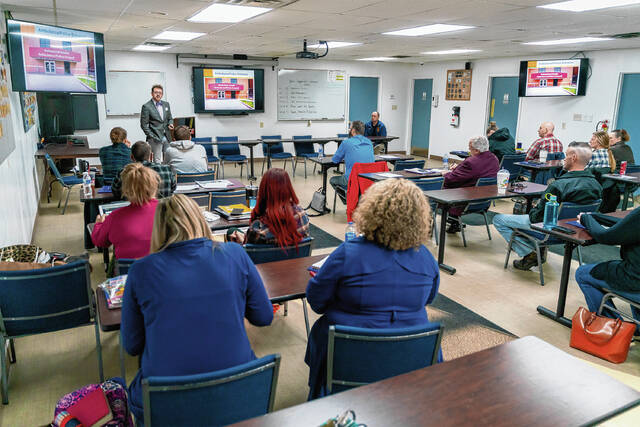
Kimble Richardson, manager of Business Development Referrals at Community Health Network in Indianapolis, speaks to first responders from the Greenwood Police Department, Johnson County Sheriff’s Office, Johnson County 911 Center, probation officers and clinicians from Adult and Child Mental Health, along with a member of the Johnson County Council on Friday at the Greenwood Police Department Training Center as part of a CIT (Crisis Intervention Team) training class.
SCOTT ROBERSON | DAILY JOURNAL
Dispatchers receive a report of a suspicious person in an alley.
Police and a mental health professional arrive and find a woman crouching behind a trash can.
The woman, named Mary, tells officers they are blowing her surveillance operation, and she is watching the birds because they are listening.
The officers and mental health professional talk to the woman, and get down on her level to find out what’s going on.
Mary tells them the alley is loud, so the officers speak in a calm voice. They ask her what’s wrong and if she’s taken any medication.
Mary tells them she hasn’t. The officers convince Mary to go with them away from the noise so they can talk, successfully deescalating the situation.
This scenario was one of several first responders from multiple area agencies, clinicians from Adult and Child Mental Health and a county council member participated in during crisis intervention team training last week.
Crisis Intervention Team, or CIT, is a partnership between law enforcement and mental health professionals to help people with mental disorders and/or addictions access the treatment they need in a crisis, rather than place them in the criminal justice system. Since the coronavirus pandemic, more Hoosiers and Johnson County residents than ever are coping with mental health issues, making it more important than ever for police to be able to adequately respond to people in the midst of crisis, which is why more and more officers from across Johnson County are undergoing the training.
Johnson County’s CIT program started in 2019. At the time, the county had nothing similar in place for mental health. Eventually, Sheriff Duane Burgess and Chief Probation Officer Angela Morris met and discussed creating a program, with the ultimate goal of having all law enforcement officers in the county trained through it, said Jim Engmark, the sheriff’s office’s community liaison.
For the sheriff’s office, 15 jail deputies and five road deputies have gone through the training so far.
To start the program, officials headed up to the Indianapolis Metropolitan Police Department for inspiration. Four representatives from the sheriff’s and probation offices participated in the program, said Chad Poynter, probation field officer.
The four representatives — Engmark, Poynter, Shannon Chambers and Damon Cox — now organize the county’s trainings, representing each of the key agencies.
This year, the county put on three week-long trainings, and four more are scheduled next year. So far, officers and representatives from the sheriff’s office, Johnson County jail, Adult and Juvenile Probation, and Greenwood and Whiteland police departments have gone through the training, Engmark said.
The program is beneficial, especially as mental health crises and suicide calls are on the rise, he said.
“(In the past) with mental health calls, officers would do immediate detention to hospital and then never hear about them again,” Engmark said. “This changes it so we can better serve our (residents). It’s been a huge shift.”
The county also has a crisis team with Adult and Child to help in these situations. For Engmark, who is the point person on these calls, every day he comes into the office, he has calls from officers asking for help connecting with the crisis team. He also helps with monthly meetings the county has with stakeholders, including Adult and Child, area hospitals and rehabilitation centers, he said.
Listening and building relationships are key in crisis intervention, said Angela Morris, chief probation officer. The class is designed to do just that.
By building relationships, they can deescalate a situation by coming up with alternative solutions and helping resolve the issue without sending people to jail. Not everyone needs to be hospitalized, so being able to ask questions and persuade people to talk to law enforcement is beneficial. An officer’s personal experience can also help tailor their response to the situation, CIT trainees said.
Observing the week-long program was eye-opening, said Jonathan T. Myers, a county council member.
The world is changing quickly, and to be in a room surrounded by people who are adapting to new realities made him proud of the county’s efforts, Myers said.
“A paradigm change is happening in this room, and out there (on the streets),” he said.
Engmark credits Burgess for the success they’ve had so far.
“The sheriff and his staff are 100% behind what we are doing,” Engmark said.
Burgess, a big supporter of the endeavor, went through the training himself last week, and is now certified through the county’s program, along with the 20 or so other law enforcement officials who have gone through the week-long training.
The ultimate goal is get every department trained in crisis intervention, Burgess said.
“We need to get people trained to help folks before they get to the jail,” he said.
County officials want to expand the training to include school resource officers, along with having officers from every department in the county participate. The program is seeking accreditation through the National Alliance on Mental Illness, or NAMI, with the accreditation likely to take effect before the next training, Engmark said.
Mooresville schools also reached out to the county about having some of their school resource officers go through the training, along with officers from Morgan County, he said.




